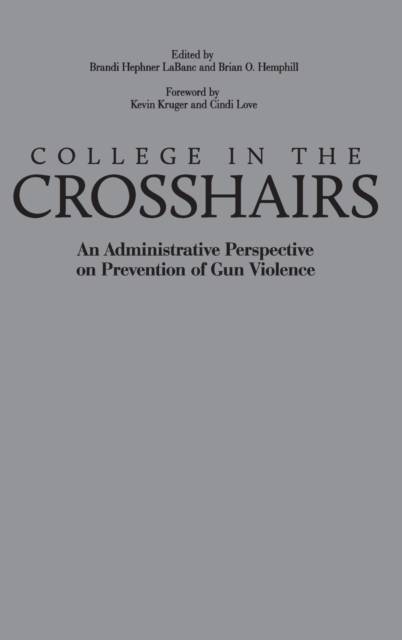
- Retrait gratuit dans votre magasin Club
- 7.000.000 titres dans notre catalogue
- Payer en toute sécurité
- Toujours un magasin près de chez vous
- Retrait gratuit dans votre magasin Club
- 7.000.0000 titres dans notre catalogue
- Payer en toute sécurité
- Toujours un magasin près de chez vous
College in the Crosshairs
An Administrative Perspective on Prevention of Gun Violence
Description
Gun violence - whether rampage shootings, homicides or suicides - is a potential reality all campuses have to face. This book provides leaders in higher education - and particularly those in student affairs - with data about past incidents, an analysis of trends, and background on the national debate about gun policies and how they impact colleges, state by state. It importantly raises issues about student psychological development, mental health, and the prevalence of alcohol and substance abuse on campus, to better inform discussion about allowing guns on campus and concealed carry. It concludes by sharing strategies for averting gun-related tragedies, and offering models for responding when they occur, based on lessons learned and best practices. The book addresses concealed carry legislation and its impact on campus policies by state, examining the concerns of administrators as they discharge their duty of care to students and comply with legal and regulatory frameworks. Asking "Are our students developmentally ready to make a morally sophisticated, life-changing decision to use firearms in response to a real or perceived threat?", it offers important perspectives and scientific data, so far absent from the debate, to shape the ongoing conversation with lawmakers and the public about what it takes to keep college communities safe.In addressing risk and prevention, contributors cover the relationship between violence and mental health, and the need to establish comprehensive strategic plans and a preventative framework that promotes help-seeking for those in need before they reach the point of crisis, as well as a campus-wide risk assessment team, stressing the importance of cultivating a community-wide approach to campus safety by empowering members to report suspicious behavior. They also offer guidance on improving effective behavior intervention and case management processes.The book concludes by outlining best practices, and providing guidance on developing an emergency plan, practicing and testing systems, and creating a robust communications strategy. Individual chapters focus on how small colleges with limited resources can develop effective plans into by partnering with local agencies; as well as on the steps that community colleges - who generally lack resident advisors and residential staff, and whose students are far more dispersed - can take to diminish risk and respond promptly and professionally to a crisis.This is an essential guide for all higher education leaders concerned about preventing violence on our campuses, and a call to action.
Spécifications
Parties prenantes
- Editeur:
Contenu
- Nombre de pages :
- 288
- Langue:
- Anglais
- Collection :
Caractéristiques
- EAN:
- 9781620363515
- Date de parution :
- 22-10-15
- Format:
- Livre relié
- Format numérique:
- Genaaid
- Dimensions :
- 155 mm x 231 mm
- Poids :
- 498 g

Les avis
Nous publions uniquement les avis qui respectent les conditions requises. Consultez nos conditions pour les avis.





